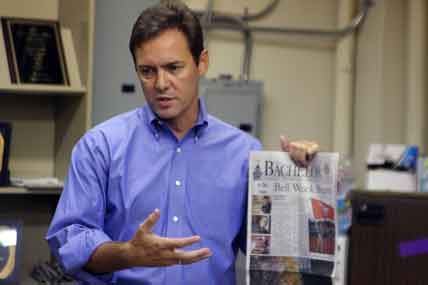Tim Padgett, the Miami and Latin America bureau chief for Time magazine, will give public lecture on Thursday, September 29 at 4:15 p.m. in room 216 in Center Hall. The 1984 Wabash graduate will talk about the current state of journalism in an Alumni Colloquium entitled “Hegel and Headline News: A New Media Dialectic."
 Padgett is returning to Indiana to receive the Clarence A. Jackson Career Service Award from the National Association of Wabash Men during Homecoming festivities at the College.
Padgett is returning to Indiana to receive the Clarence A. Jackson Career Service Award from the National Association of Wabash Men during Homecoming festivities at the College.
Padgett has covered Latin American politics, American foreign policy, the war on drugs, national and natural disasters, and scores of other topics in his 26-year journalism career. In his talk on Thursday, he'll discuss the changing face of journalism.
"Critics say the objective traditions of US journalism are under threat from the political biases of outlets like Fox News and MSNBC,” says Padgett. “But from that thesis and antithesis should come a synthesis — a Hegelian hope for our struggling media."
A Phi Beta Kappa graduate of Wabash, Padgett earned a master’s degree in journalism from Northwestern University. He started his career with Chicago’s Sun Times before moving to Newsweek. After three years in Chicago, Newsweek sent him to Mexico City as bureau chief. He later became Time magazine’s chief in Mexico City, and for the last decade he has covered Latin America from his base in Miami.
Padgett covered the Elian Gonzalez saga, the 2000 election recount in Florida, Hurricane Katrina, the earthquake in Haiti, and the Chilean mine collapse a year ago. He has interviewed the most important figures in Latin America, including Venezuela’s Hugo Chavez.
Most importantly, for 20 years Padgett has brought into clear focus the ravages of the Latin American drug trade, the gang violence, and the tens of thousands who have been murdered in drug-related crimes. In June 2011, Padgett authored Time’s cover story on the Mexican-American war on drugs.
Padgett won the Cabot Prize from the Columbia University School of Journalism for his coverage of Latin America. In presenting the award, the committee said, “The breadth of Padgett's knowledge and the gracefulness of his prose make him a worthy model for new reporters and a reminder to editors that good coverage is based on deep commitment, long experience and frequent publication.”
Padgett’s talk on Thursday is free and open to the public.